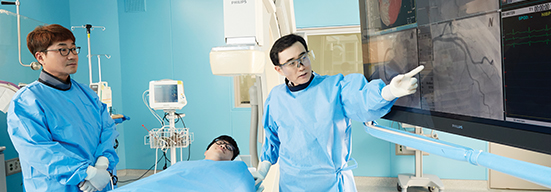The Cardiovascular Center conducts hemodynamic tests to identify the degree of blood vessel narrowing by measuring blood pressure, and the possibility of complications and economic burden of patients are reduced because only the required procedures are performed by identifying the location of lesions. Even if the degree of narrowing may seem low based on angiography, high-risk patients especially old patients over 60 years old or diabetes·stroke·hypertension patients may have blood vessels that are completely clotted or in winding branch shapes; hence the need for more precise tests such as ultrasonic. Although only the cross section of blood vessel condition can be identified through angiography with the shadows of contrast medium inserted in blood vessels in advance for radiography, this enables accurate diagnosis of blood vessel conditions of high-risk groups because ultrasound tests of blood vessels can dimensionally show the blood vessels.
Coronary artery bypass surgery is generally performed for most cases of coronary artery stenosis, but the scope of surgeries has become very broad and the risk in high-risk patient groups is very high. Therefore, the Cardiovascular Center does not stick to one treatment only, minimizes surgery risks, and maximizes treatment effects through treatments combined with coronary artery bypass surgery, stent surgery, and drug treatment.
For acute myocardial infarction patients, emergency interventional procedures (removing blood clots with operational instruments or removing blood clots through expansion) are more effective in terms of success rate or death rate than drug treatments. The Cardiovascular Center has the Emergency Interventional Procedure Team on standby 24/7 all year round as an average of 60 minutes is required to open clogged blood vessels upon arrival of the patient in the ER, and this is much faster than the medically recommended 90 minutes. The Emergency Interventional Procedure Team greatly exceeds the criteria proposed by the domestic and international cardiovascular intervention research society, possessing extensive experience of more than 13 times of general interventional procedures and more than 4 times of emergency interventional procedures.


